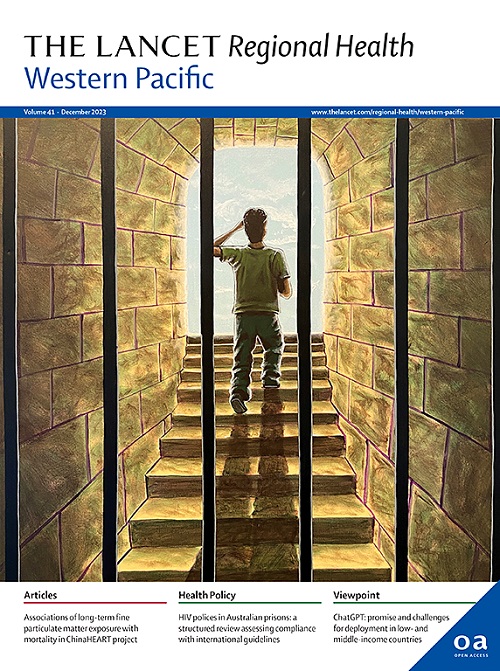Long-term efficacy and immunopersistence of an Escherichia coli-produced HPV-16/18 bivalent vaccine: an observational extension study following a randomised, double-blind Phase III clinical trial cohort
IF 8.1
1区 医学
Q1 HEALTH CARE SCIENCES & SERVICES
引用次数: 0
Abstract
Background
A safe and highly efficacious Escherichia coli-produced HPV-16/18 bivalent vaccine (Cecolin®) offers a cost-effective cervical cancer prevention measure. Here, we report data on the long-term efficacy and immunopersistence up to 10 years post-vaccination.
Methods
In the Phase III clinical trial (NCT01735006), 7372 women were enrolled and randomly assigned to receive the HPV or control vaccine (hepatitis E vaccine). Women from 2 sites (Xinmi City and Fengning County; N = 1986) were invited to participate in the extension study. Cervical samples were collected for ThinPrep Pap tests and HPV DNA testing. Serum samples from participants in the immune persistent subcohort (N = 300) were collected for neutralising antibody testing. The co-primary outcomes were high-grade cervical, vulvar or vaginal lesions and persistent infection (over 6 months) associated with HPV 16/18 in the per-protocol population.
Findings
A total of 1648 women participated in the extension study (806 from the vaccine group and 842 from the control group). Over a median 10.2-year follow-up, vaccine efficacy was 87.5% (95% CI 6.4–99.7) against high-grade cervical, vulvar or vaginal lesions (1 case in the vaccine group and 8 cases in the control group, P = 0.0391), and 97.0% (95% CI 78.9–100.0) against persistent infection (over 6 months, 1 case in the vaccine group and 32 cases in the control group, P < 0.0001) in the per-protocol population. The GMCs of neutralising antibodies peaked by month 7, declined through month 42, with HPV-16 plateauing and HPV-18 continuing to decline thereafter. At 114 months, 98.9% (93/94) of baseline seronegative participants remained seropositive for HPV-16 with the GMC of 61.84 IU/mL and 97.0% (98/101) remained seropositive for HPV-18 with the GMC of 18.73 IU/mL.
Interpretation
The E. coli-produced HPV 16/18 bivalent vaccine elicits sustained antibody responses and confers durable protection against HPV 16/18 associated high-grade cervical, vulvar or vaginal lesions and persistent infections for a minimum of 10 years post-vaccination.
Funding
National Key Research and Development Program of China (2023YFC2307602), National Natural Science Foundation of China (823B2086, 82273640), Beijing Natural Science Foundation (L244091), and Fundamental Research Funds for the Central Universities (20720220005).
大肠杆菌生产的HPV-16/18二价疫苗的长期疗效和免疫持久性:一项随机、双盲III期临床试验队列后的观察性扩展研究
一种安全高效的大肠杆菌生产的HPV-16/18二价疫苗(Cecolin®)提供了一种具有成本效益的宫颈癌预防措施。在这里,我们报告了疫苗接种后长达10年的长期疗效和免疫持久性的数据。方法在III期临床试验(NCT01735006)中,7372名妇女被纳入,随机分配接受HPV或对照疫苗(戊型肝炎疫苗)。2个地点(新密市和丰宁县,N = 1986)的妇女被邀请参加扩展研究。收集宫颈样本进行薄prep巴氏试验和HPV DNA检测。收集免疫持久亚队列参与者(N = 300)的血清样本进行中和抗体检测。共同主要结局是在每个方案人群中,宫颈、外阴或阴道高度病变和与HPV 16/18相关的持续感染(超过6个月)。研究结果:共有1648名妇女参加了扩展研究(806名来自疫苗组,842名来自对照组)。在中位10.2年的随访中,疫苗对宫颈、外阴或阴道高度病变(疫苗组1例,对照组8例,P = 0.0391)的有效性为87.5% (95% CI 6.4-99.7),对持续感染(超过6个月,疫苗组1例,对照组32例,P < 0.0001)的有效性为97.0% (95% CI 78.9-100.0)。中和抗体的gmc在第7个月达到峰值,在第42个月下降,HPV-16趋于稳定,HPV-18此后继续下降。114个月时,98.9%(93/94)的基线血清阴性参与者的HPV-16血清阳性,GMC为61.84 IU/mL, 97.0%(98/101)的HPV-18血清阳性,GMC为18.73 IU/mL。大肠杆菌生产的HPV 16/18二价疫苗引起持续的抗体反应,并在接种后至少10年内对HPV 16/18相关的高度宫颈、外阴或阴道病变和持续感染提供持久的保护。国家重点研发计划项目(2023YFC2307602),国家自然科学基金项目(823B2086, 82273640),北京市自然科学基金项目(L244091),中央高校基本科研业务费专项基金项目(20720220005)。
本文章由计算机程序翻译,如有差异,请以英文原文为准。
求助全文
约1分钟内获得全文
求助全文
来源期刊

The Lancet Regional Health: Western Pacific
Medicine-Pediatrics, Perinatology and Child Health
CiteScore
8.80
自引率
2.80%
发文量
305
审稿时长
11 weeks
期刊介绍:
The Lancet Regional Health – Western Pacific, a gold open access journal, is an integral part of The Lancet's global initiative advocating for healthcare quality and access worldwide. It aims to advance clinical practice and health policy in the Western Pacific region, contributing to enhanced health outcomes. The journal publishes high-quality original research shedding light on clinical practice and health policy in the region. It also includes reviews, commentaries, and opinion pieces covering diverse regional health topics, such as infectious diseases, non-communicable diseases, child and adolescent health, maternal and reproductive health, aging health, mental health, the health workforce and systems, and health policy.
 求助内容:
求助内容: 应助结果提醒方式:
应助结果提醒方式:


